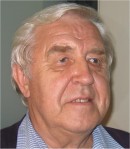|
Plenary
Lecture
General Problems of the Sampling-Reconstruction
Procedure of Random Process Realizations

Professor Vladimir A. Kazakov
National Polytechnic Institute of Mexico
ESIME-Zacatenco, SEPI, Department of Telecommunications
Av. IPN, s/n, ESIME-Zacatenco, Ed. "Z-4", 3-r piso, D.F.
C.P. 07738, Mexico
E-mail:
vkaz41@hotmail.com
Abstract: The Sampling-Reconstruction Procedure
(SRP) of random process and field realizations is a very
popular problem during a lot of decades. Unfortunately,
this problem is completely not solved until present
time. There is a well-known Balakrishnan/s theorem. This
theorem describes SRP of stationary random process
realizations. This theorem is characterized by some
principal drawbacks: the probability density function
(pdf) is not used; the mathematical model of sampled
process is not realizable; the number of samples is
equal to infinity; the reconstruction procedure is
linear and the same for all types of random processes;
the reconstruction error is equal to zero for all types
of the processes.
In order to overcome these drawbacks, we suggest to use
the conditional mean rule (CMR) for the statistical
description of the SRP of random processes and fields.
We take into account the pdf of sampled processes and
fields. We can analyze the SRP of the following types:
the process can be stationary or no stationary, the
number of samples is arbitrary and limit, the intervals
between neighbor samples can be arbitrary or periodical,
etc. Generally, one can declare: any random process must
have its own optimal reconstruction algorithm and
reconstruction error function. In the case of Gaussian
processes the reconstruction function is linear function
and the reconstruction error function does not depend on
the values of samples. If the sampled process is non
Gaussian, then the reconstruction function is a non
linear function of samples and the reconstruction error
function depends on the samples. We illustrate these
points by a lot of examples, including the SRP with
jitter. Majority of our results are related with the SRP
of continuous processes. But, additionally, we give same
new results with respect of the SRP of processes with
jumps.
Brief Biography of the Speaker:
Vladimir Kazakov was born in Moscow region in Russia in
1941. He received the Ph. D. degree in 1967 and the Full
Doctor of Science degree in 1990 from Moscow Power
Engineering Institute (Technical University). During
1966 – 1996 he worked in Ryazan Radioengineering
University. Since 1996 until the present time he has
worked in the National Polytechnic Institute of Mexico.
His principal research interests lie in the statistical
communication theory. He is the author of more than 200
scientific publications, among of them 2 books, 2
chapters of books, more than 50 papers in the
International Journals, 17 patents of Russia and 2
patents of Mexico.
|
